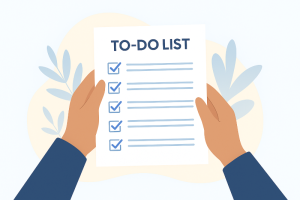🧾 First Steps for an Executor (UK Edition)
Being named an executor — or stepping in as next of kin when there is no will — can feel overwhelming. This guide gently explains the first things you’ll need to do in the UK, step by step.
🌱 At a glance: first duties of an executor
- Register the death
- Secure property and belongings
- Locate the will (if there is one)
- Gather key documents
- Check if probate is required
- Look into Inheritance Tax (IHT)
- Notify organisations and government bodies
- Decide if you want professional help
💡 What is an executor?
An executor is legally responsible for carrying out the instructions in a will.
If there is no will, the closest next of kin usually becomes the administrator. In both cases, you’ll manage the estate — the person’s property, finances, possessions, and debts.
🪪 Step 1: How do I register the death?
You usually need to register a death within:
- 5 days in England, Wales, Northern Ireland
- 8 days in Scotland
✅ Bring:
- Medical Certificate of Cause of Death
- Details about the person (name, DOB, place of death, occupation, etc.)
📍 Use GOV.UK to find your local register office.
🏡 Step 2: How do I secure the property?
If the person lived alone or you’re worried about security:
- Lock windows and doors
- Redirect post (Royal Mail Redirection)
- Notify the building insurer of the death
- Pause or adjust utilities if needed
📜 Step 3: How do I locate the will?
Check for:
- A physical copy in a safe place
- A solicitor or bank that may hold it
- Online storage services (e.g., National Will Register)
💡 If you can’t find a will, the estate is handled under intestacy rules.
🗃️ Step 4: What documents should I gather?
Start with:
- Death certificate (order several copies)
- The will (if any)
- Identification (yours and the deceased’s)
- Financial papers (bank, pension, insurance, mortgage)
- Details of property, debts, and assets
💡 WithYou Tip: Use a digital folder or checklist to stay organised.
⚖️ Step 5: Do I need probate?
Probate gives you legal permission to access the estate.
- If there’s a will → apply for a Grant of Probate
- If no will → apply for Letters of Administration
✅ Probate is usually needed if:
- The estate includes property or land
- Sole accounts hold more than £5,000–£50,000 (varies by bank/provider)
Check with each bank for their threshold.
📍 See GOV.UK: Apply for Probate.
💷 Step 6: Do I need to pay Inheritance Tax?
You may need to complete IHT forms, even if no tax is due.
- Most estates under £325,000 are exempt
- Anything left to a spouse or charity is usually tax-free
- Use the HMRC IHT Calculator to estimate
💌 Step 7: Who should I notify?
Organisations to contact include:
- HMRC (tax)
- DWP (benefits/pension)
- Local council (council tax, blue badge)
- Banks, insurers, and utilities
- Memberships and subscriptions
👉 Use the Tell Us Once service (England, Wales, Scotland) to notify multiple government departments in one go.
